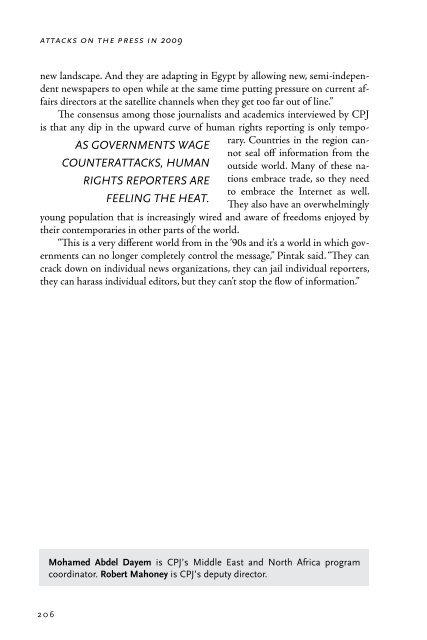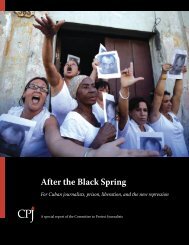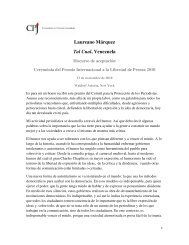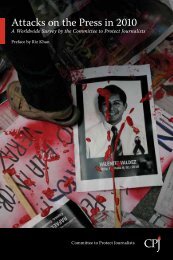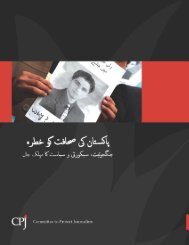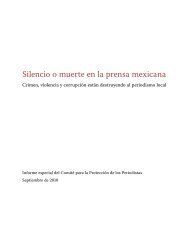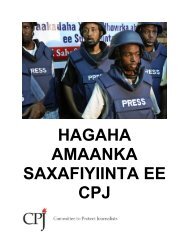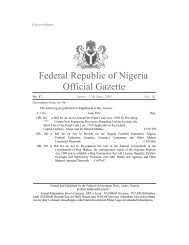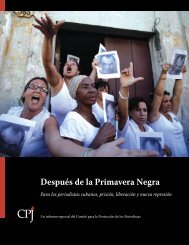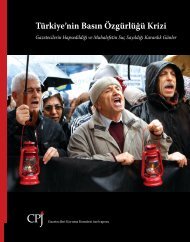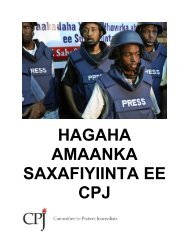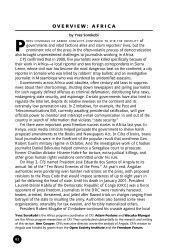Attacks on the Press - Committee to Protect Journalists
Attacks on the Press - Committee to Protect Journalists
Attacks on the Press - Committee to Protect Journalists
- No tags were found...
Create successful ePaper yourself
Turn your PDF publications into a flip-book with our unique Google optimized e-Paper software.
attacks <strong>on</strong> <strong>the</strong> press in 2009middle east and north africa: bahrainAs governments wagecounterattacks, humanrights reporters arefeeling <strong>the</strong> heat.new landscape. And <strong>the</strong>y are adapting in Egypt by allowing new, semi-independentnewspapers <strong>to</strong> open while at <strong>the</strong> same time putting pressure <strong>on</strong> current affairsdirec<strong>to</strong>rs at <strong>the</strong> satellite channels when <strong>the</strong>y get <strong>to</strong>o far out of line.”The c<strong>on</strong>sensus am<strong>on</strong>g those journalists and academics interviewed by CPJis that any dip in <strong>the</strong> upward curve of human rights reporting is <strong>on</strong>ly temporary.Countries in <strong>the</strong> regi<strong>on</strong> cannotseal off informati<strong>on</strong> from <strong>the</strong>outside world. Many of <strong>the</strong>se nati<strong>on</strong>sembrace trade, so <strong>the</strong>y need<strong>to</strong> embrace <strong>the</strong> Internet as well.They also have an overwhelminglyyoung populati<strong>on</strong> that is increasingly wired and aware of freedoms enjoyed by<strong>the</strong>ir c<strong>on</strong>temporaries in o<strong>the</strong>r parts of <strong>the</strong> world.“This is a very different world from in <strong>the</strong> ’90s and it’s a world in which governmentscan no l<strong>on</strong>ger completely c<strong>on</strong>trol <strong>the</strong> message,” Pintak said. “They cancrack down <strong>on</strong> individual news organizati<strong>on</strong>s, <strong>the</strong>y can jail individual reporters,<strong>the</strong>y can harass individual edi<strong>to</strong>rs, but <strong>the</strong>y can’t s<strong>to</strong>p <strong>the</strong> flow of informati<strong>on</strong>.”BAHRAINBahrain has made significant strides in improving its humanrights record since political reforms enacted in 2001, particularly c<strong>on</strong>cerning universalsuffrage and <strong>the</strong> dismantlement of an abusive state security court system.But some reforms have yet <strong>to</strong> be fully realized, am<strong>on</strong>g <strong>the</strong>m improving politicalrepresentati<strong>on</strong> for <strong>the</strong> marginalized Shiite majority and ensuring more equitablestanding for women in family courts. The press freedom climate, which hadimproved with <strong>the</strong> establishment of seven independent newspapers in <strong>the</strong> wakeof <strong>the</strong> 2001 reforms, has underg<strong>on</strong>e a gradual deteriorati<strong>on</strong> over <strong>the</strong> past severalyears. That decline accelerated in 2009 as <strong>the</strong> government blocked domesticaccess <strong>to</strong> more than 1,000 Web sites and pursued politicized court complaintsagainst critical journalists.Culture and Informati<strong>on</strong> Minister Sheikha Mai bint Muhammad Al-Khalifaissued an order in January compelling Internet service providers <strong>to</strong> block Websites identified as offensive by <strong>the</strong> ministry. Despite protests from numerous pressfreedom groups, including CPJ, <strong>the</strong> government blocked dozens of sites in <strong>the</strong>first eight m<strong>on</strong>ths of <strong>the</strong> year. The censorship effort escalated in September, when<strong>the</strong> Ministry of Informati<strong>on</strong> ordered <strong>the</strong> Telecommunicati<strong>on</strong>s Regula<strong>to</strong>ry Authority,<strong>the</strong> government’s Internet regula<strong>to</strong>r, <strong>to</strong> block 1,040 more sites, according<strong>to</strong> <strong>the</strong> Bahrain Center for Human Rights. Although <strong>the</strong> government characterizedits campaign as being aimed at pornography, CPJ research shows that journalisticblogs, news Web sites, discussi<strong>on</strong> forums, and human rights Web siteswere also blocked. Internet users who attempted <strong>to</strong> reach those pages were metwith a screen that read: “This Web site has been blocked for violating regulati<strong>on</strong>sand laws of <strong>the</strong> Kingdom of Bahrain.”With <strong>on</strong>e of <strong>the</strong> most Web-c<strong>on</strong>nected populati<strong>on</strong>s in <strong>the</strong> regi<strong>on</strong>—a third ofits residents are <strong>on</strong>line—Bahrain had been home <strong>to</strong> hundreds of Web sites, according<strong>to</strong> <strong>the</strong> Bahrain Center for Human Rights. Am<strong>on</strong>g <strong>the</strong>m were about 200blogs, many focusing <strong>on</strong> political and social issues and most written an<strong>on</strong>ymously.Bahrain filters sites critical of <strong>the</strong> government, <strong>the</strong> ruling family, and Islam,according <strong>to</strong> August 2009 findings published by OpenNet Initiative, an academicpartnership that studies Internet censorship.The <strong>on</strong>line dicho<strong>to</strong>my reflects <strong>the</strong> country’s political development over <strong>the</strong>Mohamed Abdel Dayem is CPJ’s Middle East and North Africa programcoordina<strong>to</strong>r. Robert Mah<strong>on</strong>ey is CPJ’s deputy direc<strong>to</strong>r.Country summaries in this chapter were reported and written by Middle Eastand North Africa Program Coordina<strong>to</strong>r Mohamed Adbel Dayem, ResearchAssociate Mariwan Hama-Saeed, Middle East Representative Kamel EddineLabidi, and freelance writer Lilia Bellahsene.2062 0 7


